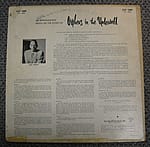The following is an attempt at a
literal translation of Orpheus In The Underworld,
hence the clumsy English diction and awkward
sentence structure:
BAND 1
Once long ago there lived a youth named Orpheus. The
Gods loved Orpheus so much that they endowed him
with two gifts: the gift of poetry and the gift of
music. And the great God Apollo gave him a golden
lyre.
Orpheus sang and played with such perfection that he
cast an enchantment over everything about him. So
moving were his songs and the mush: of his lyre that
he even charmed the hard rocks and the whispering
trees. Streams turned in their courses to follow him
and wild beasts became gentle and gathered about
him in peace.
BAND 2
One day as Orpheus wandered through the woods he
fell in love with a nymph called Eurydice. Their
happiness was as beautiful as the sky and the sea.
And Hymen, the God of Marriage, flew down from
Olympus in his saffron-colored robe to wed them. But
the joy of their love was quickly destroyed, for on
that very day, as Eurydice wandered in a meadow, she
was bitten by a (poisonous) viper and died leaving
Orpheus alone in consuming sorrow.
BAND 3
Orpheus now wandered aimlessly through the land
playing sad tunes and singing of his grief. At
length, unable to bear his sorrow any longer,
Orpheus appealed to Jupiter to grant him permission
to go to the Underworld to ask Hades for his
beautiful bride. Such a thing. had never before been
granted to a mortal.
but Jupiter conceded.
BAND 4
Orpheus started out at once on the long, dangerous
journey to the World of the dead. In his search he
passed all kinds of desolate, shadowy beings. He saw
the Griefs, Avenging Care, the Pale Diseases, and
Melancholy Age. He passed Fear and Hunger. He saw
Toil, Poverty and Death. The Cruel Furies, gazed on
him with ugly faces.
BAND 5
The strains of the golden lyre filled the Underworld
and from every side the shadows, as under a spell,
gathered around Orpheus.
Then Orpheus, standing before them, sang a song of
sorrow. "O sovereigns of the Underworld, hear the
words of my breaking heart. Love has brought me
here. I have not come to seek out the secrets of
your dark abode, I have come only to find Eurydice,
my beloved, she who died before her youth was
spent." Then Orpheus sang on teliing of his love and
his loneliness. In the end he pleaded: "And so I
sing, imploring you, tie once more the thread of her
mortal life. Then when she has filled her time on
earth she will return to you but until then give her
back to me, this I beseech you."
BAND 6
(He then tells the court the dangers he Willingly
underwent in order to get to his beloved Eurydice):
He passed the Monster Briareus with his hundred
whirling arms and the nine headed Hydra. Further on
he saw the terrible fire-breathing Chimaera. He even
encountered Tityus, the giant whose massive body
covered nine acres. Any or all of this he would
gladly do again if only he could gain the court's
favor to take his beloved back to the sunlit world
above.
BAND 7
(After his pleading he retires to another nearby
section to await the decision of the Court.)
BAND 8
The members of the Underworld conferred and Hades
could not deny Orpheus' plea. Very majestically they
gave Orpheus permission to lead Eurydice out of the
Underworld and back to the land of the living.
However, there was one condition which they imposed;
Orpheus would lead the way and she would follow, and
never once was he to look back at her until they had
both reached the sunlit world. And so Orpheus and
Eurydice started on their happy journey homeward.
BAND 9
At last after many hours Orpheus saw the first faint
light of day. In joy, he hurried on ahead but
forgetting the warning of the Gods, he turned
around. He smiled happily and held out his arms to
receive her but suddenly she began to vanish like a
vision fading. He had looked around too soon. Slowly
she slipped back into the darkness.
BANDS 10 and 11
After many long days of wandering Orpheus died. At
last his spirit was free from mortal ties and he
descended to the Land of the Dead. He found his
beloved Eurydice and together they roamed the fields
and hills of the land of the shadows in everlasting
happiness.

 The four most important
requisites of successful musical composition are:
The four most important
requisites of successful musical composition are:

